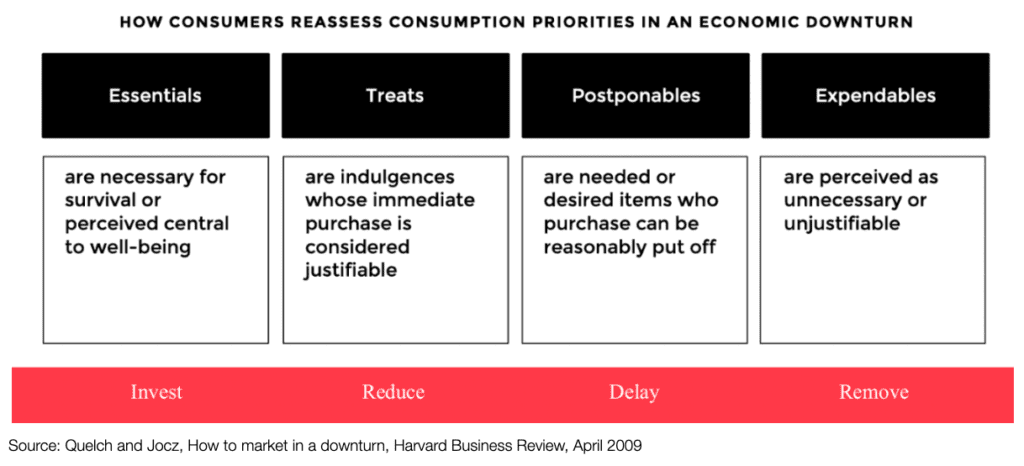Thoughts by our CEO, Anthony Rawlins

Navigate have the privilege of organising The Association of Leading Visitor Attractions (ALVA) Heads of Marketing forums twice a year.
One event saw the top billing go to Richard Huntington, Strategy Director at Saatchi and Saatchi. His presentation on consumer trends and psychology was sobering at times, but also suggested areas attraction marketers could focus on, to maximise success in what looks to be a challenging year ahead.
One key area was making your attraction an ‘essential’ and not a ‘treat’ - see more below…
______________________________________________________________
The financial crisis will affect us all in different ways, and the following illustration identifies the potential impact on consumer purchases next year.
In brief; purchases that fall in the 'expendables' category can be removed, those that fall into the 'postponables' category can be delayed, any that fall into the 'treats' category (which is where most attractions commonly fall) can be reduced, and any purchases that fall into the 'essentials' category will be a non-negotiable investment.
Take a look at this chart below, to see what this means for you.

6 Ways To Be Seen As Essential
1. A Parents Duty
Family audiences are a foundation we build our visitor numbers on, for many attractions. Yet a recent BVA-BDRC survey showed that many people expect to reduce their visits to many attraction types. How can attraction marketers combat this? By repositioning themselves. Leaning into the hope that attractions give future generations, parents can fulfil their duty of educating children about future career paths. Making visits essential.
How can we create the next generation of space explorers or rocket scientists without educating them about the wonders of space? Which child will be inspired by a career in creativity or design without seeing it in action? What about the Arts? How can we encourage kids to become artists, dancers, or actors without taking them to galleries and theatres?
Inspiring future generations with the vast careers and passions they could pursue doesn't happen by chance. It happens through experiences, so we need to be mindful of not robbing them of these experiences.
Parents will see this as an essential duty of theirs. To expose their children to as much of the world as possible so they can make the best choices. Attractions can lean into this by creatively showing a straight line from visiting them to inspiring future careers.
2. The Clock is Ticking
Children don't stay young forever, and every one of us has a certain number of trips around the sun. Simply, creating lasting memories is essential for the whole family, from kids to parents or grandparents.
It’s hard to find something more important to our society than relationships. And true, deep relationships are built on shared experiences.
So, attractions can leverage these ‘essential’ memories by reminding us what's important. Attractions are facilitators of these moments and experiences that strengthen the bonds of our essential relationships.
But to truly get the point across, we need to acknowledge and highlight that the opportunities to create memories are finite. Kids grow up, and grandparents won't be around forever. If we don't make these memories NOW, will we ever be able to make them?
Making memories in isolation doesn’t seem compelling enough to move an attraction visit into ‘essential’, as this memory-making is postponable by a year or two. But highlighting that once these moments to make memories have passed, they might not come around again, repositions memory making back into ‘essential’ activity by leveraging scarcity.
3. Stuff Vs Travel
This advert for Expedia aired at Super Bowl 2022 has done a grand job for us. Very succinctly, it highlights that it’s not about the things we have but about the places we’ve been. And this is great for Expedia, who don't mind where you travel, as long as you travel with them. But how can attractions leverage this philosophy?
Well, perhaps an everyday comparison might be better here. It’s not about those five lattes during the week, it's the thrills, smiles and screams when you go with your partner to a theme park for the weekend.
And it's not about that new t-shirt you purchased or that extra set of trainers you don't need, it’s about taking the grandparents on a steam train ride! Everyday comparisons of stuff vs experiences are the way to go here, and attractions marketers might do well to try and localise this. Specific examples relatable to each audience of the everyday stuff people might want to forgo, for the unique experiences they could have might be the way to do it.
4. Explore The Right Side of The Door
What are we doing this weekend?
Whether this is asked by your partner, kids, or in-laws who are visiting, there’s a strong personal desire not to be boring and say, ‘we're staying in’.
I believe it’s essential for us not to be considered boring, and it’s essential for our kids not to be on tablets or cooped up inside all weekend.
Few of us want to or could manage to live a life where we stay inside, so whatever the motivation to explore on the right side of the door, your attraction could be the solution to this question.
When you head into work on a Monday, or your child goes into school and people ask how the weekend was, which is more likely to stick in your memory? How you stayed in and watched Netflix or how you visited your local attraction? Because it’s part of our DNA to seek out memories, it's important attractions are leaning into this and using it to make themselves more essential.
5. Be The ‘Day Out’ Hero
Following on from this idea, I’m reminded of this brilliant advert from booking.com. A 2014 advert portrays the person who books the trip as the hero. Whilst this is hilariously tongue-in-cheek, the emotion behind it is real.The ‘day out’ organiser knows that the success or failure of the trip can reflect on them, and for them, it is ‘essential’ not to get it wrong. Attractions can convert an innate ‘fear’ of getting it wrong, to relief when things go right.
The ‘day out’ organiser knows that the success or failure of the trip can reflect on them, and for them, it is ‘essential’ not to get it wrong. Attractions can convert an innate ‘fear’ of getting it wrong, to relief when things go right.
Your attraction can make the day-out organiser a hero, and there is certainly a creative route that can be worked up here, for your attraction.
Why not put together an easy-to-understand and replicable itinerary on your website? Make it easy for your visitors to be the hero.
6. We Need To Care
Finally, let's listen to Sir David Attenborough.
“No one will protect what they don't care about, and no one will care about what they haven’t experienced.”
There are many attraction types that better connect us with our natural world. To fix the climate emergency, we need a lot more people to care a whole lot more. And experiencing attractions that seek to promote conservation and the protection of our natural world is one clear-cut way to increase how much we all care.
Perhaps this isn't essential for the individual, but it is for our planet and future generations who hope to live here. So, one way to position your attraction as essential is, where possible, to lead into conservation and environmental messaging, which inspires action in defence of our natural world.
So, now what?
It is time to ensure you're positioning yourself as an essential.
These six perspectives should help give you an idea of the best way for your brand to do this. Whether you let people know they need you to help their children's, their planet's, or their own future, make sure they know loud and clear!
There's no better opportunity to get a head start on a fresh start.
Make Contact
Do you like how we do things? If so, and your brands’ mission helps to save our planet, then we should talk - because we can guarantee our discussion will help you.
Fill out the form below, to start a conversation.

Anthony Rawlins, Navigate CEO
I’ve spent the last 18 years honing my marketing and strategic skills in the travel, tourism and experience sectors. As an entrepreneur, I’ve also created several other companies to make the most of opportunities I see in our industry and the wider world of business.